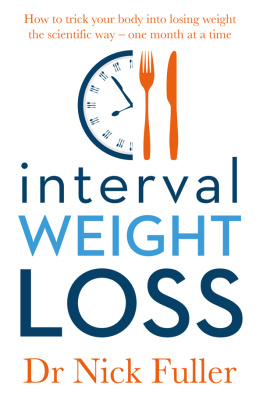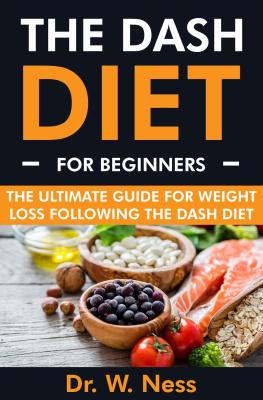CHAPTER 1
THE PROBLEM WITH FAD DIETS
Failure isnt fatal, but failure to change might be. John Wooden
Approximately two in three adults are overweight or obese in Australia, and in most countries the problem is only escalating, making it a global epidemic. A large shift in technological advancement means that we now live in an environment that challenges us to lead a healthy lifestyle.
Back in the 1970s we used to engage in more leisure activities, walk everywhere, and often had more physical jobs. We would play in the park with our children and visit friends, instead of spending time on mobile phones, video games and computers. By contrast, nowadays we are time-poor, we work longer hours, and more is expected of us both at home and at work. Worklife balance is rare as we devote less and less time to our health. As a result, we simply dont move enough, and we frequently consume high-energy convenience foods, which results in weight gain.
What has this meant for us? Well, we now live in a world where fitness centres and gyms are popping up on every corner, and every week someone else is publishing the next weight-loss diet that will solve everyones problems. But rather than solve anything, things have only got worse much worse. Despite the fact that most of all known modern diets were invented from the 1980s onwards, obesity rates since then have actually trebled! Clearly, diets have done nothing to curb the obesity epidemic. If anything, it could be argued that diets have contributed to the rise of the very thing they claim to diminish: we are dieting ourselves to obesity.
In order to examine how this contradiction is possible, lets consider a patient of mine. Jennifer, a 29-year-old female, is a comfortable 68 kilograms. At 169 centimetres tall and with a body fat of 28 per cent she would be considered in the healthy weight range. Jennifer is going on a beach holiday to Hawaii in six weeks and her stated goal is to get her weight down to 62 kilos by the time she leaves. This equates to a total body weight reduction of approximately 9 per cent. The good news is that through a series of detox teas, vegetable soups and a total ban of all sweets, Jennifer is successful at hitting her desired weight for the Hawaii trip. She has a fabulous holiday and meets a nice new bloke from Toowoomba.
So whats the problem? I hear you say. In isolation, nothing! Except something happens over the next few months after Jennifers return. Her bodys innate response kicks in and it feels compelled to go back to its pre-defined pre-holiday weight. For every action there is an equal and opposite reaction. But, listen up, Jennifer does not return to 68 kilos. Due to the stress she has imposed on her body by her most recent diet, not to mention the many other diets she has been on previously, her body not only climbs back to its original weight, it blasts through 68 kilos like a Sunday morning cyclist whipping past you in canary yellow Lycra. Six months after the famous holiday where Jennifer met Mr Toowoomba, she has become worried that shes become fat. How did this happen? she asks herself while looking back at the holiday pictures. Good question, Jennifer!
The diet trap
Jennifers question is a common one, and the answer is that dieting has resulted in her body going into a state of starvation due to severe energy and nutrient restriction. Her energy and nutritional intake were so low, and her diet so poor that her body in essence began to slow, or shut down metabolically, to hold onto its reserves in response to her weighing less. Accompanying this innate response to energy restriction was an increase in her appetite hormone signalling to her brain to tell her to eat more.
Research has shown that these appetite hormone levels remain elevated above normal a year after finishing a reduced-energy weight-loss diet. What does that mean? It means that Jennifers body is still signalling to her to eat more so that she can bounce back to her starting weight.
You might be saying to yourself, Im not like Jennifer. Diets work for me, and that may well be true the first time you go on a diet. The first time you follow one, you will lose weight (and it doesnt matter what the diet is), and you may keep it off for a while. But if you come off the diet, your weight is likely to rebound to where it was if not a couple of kilograms higher than where you started, as was the case with Jennifer. The next time it will be harder to lose as much weight; and the time after that, even harder. As a result, your body weight will reset at a higher starting point each time you diet.

















